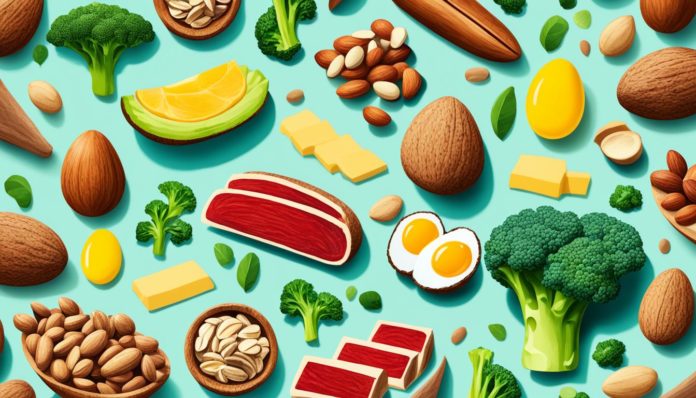Selenium is a vital trace element for our bodies. It plays a big role in fighting diseases and keeping us well. This mineral is key for good health because it works as an antioxidant and helps make important enzymes.
Research shows how important selenium is for nutrition. It urges us to get enough selenium from foods or supplements. Selenium aids in many body functions, making it a foundation for good health.
Key Takeaways
- Selenium is a crucial trace element for human health.
- It acts as an antioxidant and aids in enzyme production.
- The mineral supports overall wellness and disease resistance.
- Studies emphasize the importance of adequate selenium intake.
- Diet and supplementation can help meet selenium requirements.
What is Selenium?
Selenium is a key mineral that our bodies need to stay healthy. It is found in several proteins that are essential for many of our body functions.
The Role of Selenium in the Body
Selenium is crucial for making DNA and managing thyroid health. It also fights off damage from free radicals. This nutrient supports a strong immune system and helps us feel our best. It’s important to have the right amount of selenium for good health.

Natural Food Sources of Selenium
Eating the right foods can help you get enough selenium. Foods like Brazil nuts, seafood, and organ meats are great sources. They make selenium easier for your body to use and also offer other nutrients. Adding these to your diet helps cover your selenium needs and supports your health.
Health Benefits of Selenium
Selenium is an essential mineral for our bodies. It helps us stay healthy in many ways. It improves our antioxidant defenses, thyroid functions, and immune system.
Antioxidant Properties
Selenium fights oxidative stress as an antioxidant. It protects cells from damage by free radicals. By eating foods high in selenium, we can keep our cells healthy.

Thyroid Function Support
Selenium is vital for the thyroid gland. It helps convert thyroid hormones into a form that our bodies can use. This process is crucial for our metabolism and energy levels. Keeping our thyroid healthy is another reason selenium is important.
Immune System Boost
Selenium also boosts our immune system. It helps our bodies fight off infections. By eating selenium-rich foods, we can make our immune system stronger.
| Health Benefit | Function | Impact |
|---|---|---|
| Antioxidant Properties | Combats oxidative stress | Maintains cellular integrity |
| Thyroid Support | Hormone conversion | Regulates metabolism |
| Immune System Boost | Enhances defense against infections | Improves immune function |
Selenium and Disease Prevention
Adding selenium to your diet is good for disease prevention. It’s crucial for better heart health and fighting cancer. It works in many ways to do this.
Heart Health
Selenium is vital for a healthy heart. Research shows it helps heart health by fighting inflammation and stress from oxidation. These actions help clean up harmful free radicals.
By doing this, selenium lowers the chance of heart diseases. This makes it a key nutrient for our health.
Cancer Prevention
Selenium is also known for its fight against cancer. Many studies show it can lower cancer risks. It does this by protecting cells from damage and supporting their health.
It boosts the body’s cancer defense mechanisms. This strengthens the immune system. Thus, it lowers the chance of cells turning cancerous. Selenium is essential for a diet that fights diseases.
Selenium Deficiency: What You Need to Know
It’s important to know about health consequences of not getting enough selenium. This mineral is vital for our health. Without it, we could face serious problems like heart disease (Keshan) and joint disease (Kashin-Beck).
Selenium deficiency symptoms can show up differently in people. You might feel tired, have weak muscles, or get sick easily. If you live where the soil has little selenium, you could be at risk. Eating foods with selenium is a good way to stay healthy. You can learn more about these risk factors and how to avoid them.
Let’s look at some common signs of not having enough selenium:
| Symptoms | Description | Risk Factors |
|---|---|---|
| Fatigue | General tiredness and lack of energy | Poor dietary intake, selenium-poor soils |
| Muscle Weakness | Reduced muscle strength and endurance | Aging, chronic illness |
| Immune Dysfunction | Increased susceptibility to infections | Malnutrition, compromised health conditions |
| Cardiomyopathy | Heart muscle disease (Keshan disease) | Low selenium levels in soil and diet |
| Joint Issues | Osteoarthropathy (Kashin-Beck disease) | Geographic selenium deficiency |
To avoid health consequences, check your selenium intake. Knowing about risk factors helps prevent selenium deficiency. This will keep you healthier in the long run.
Daily Recommended Intake of Selenium
It’s important to know how much selenium you need every day to stay healthy. The amount you need changes with your age and whether you’re a boy or girl. This is because people at different stages of their lives need different amounts of nutrients.
Guidelines for Different Age Groups
Selenium needs are specific to each age group. Infants, kids, teenagers, adults, and the elderly all have unique requirements. For example, babies from birth to 6 months need 15 micrograms a day. But, adults need about 55 micrograms a day to be healthy.
| Age Group | Selenium RDA (mcg/day) |
|---|---|
| 0-6 months | 15 |
| 7-12 months | 20 |
| 1-3 years | 20 |
| 4-8 years | 30 |
| 9-13 years | 40 |
| 14-18 years | 55 |
| 19+ years | 55 |
Balancing Selenium Intake
Getting the right amount of selenium is key. Too little or too much can cause problems. Eating foods like nuts, seafood, and meats can help you reach the right levels. In many places, food alone gives you enough selenium, so you don’t need to take extra.
But, eating too much selenium is not good for you. It’s best to stick to the recommended amounts. For those looking to learn more about safe ways to increase selenium, check out this helpful guide on essential minerals.
Selenium Supplements: Are They Necessary?
Selenium is a vital mineral for our bodies. It helps with metabolism, thyroid health, brain function, and fights oxidative stress. Some people in the U.S. might not get enough selenium. Especially if they can’t get all nutrients from their diet.
We should first try to get selenium from foods like Brazil nuts, seafood, and eggs. For those finding it hard to meet selenium needs, pills are an option. Yet, seeking medical advice before starting supplements is wise.
Taking selenium supplements can fill nutritional gaps. But too much selenium can be harmful. It’s important to keep intake in check and be aware of risks.
Here’s a look at how much selenium is in different foods:
| Food Source | Selenium Content (µg per serving) |
|---|---|
| Brazil Nuts | 544 |
| Tuna (cooked) | 92 |
| Eggs | 15 |
| Oatmeal | 13 |
| Baked Beans | 6 |
It’s crucial to adjust selenium intake based on your diet. Supplements like selenium can be helpful for specific needs. Remember to be cautious of possible side effects.
Potential Side Effects of Selenium Overconsumption
Selenium keeps us healthy. But too much can cause selenosis. This includes stomach upset, hair fall, and brain issues. These are serious health risks. Stick to the right amounts to stay safe.
| Symptom | Description |
|---|---|
| Gastrointestinal Upset | Includes nausea, vomiting, and diarrhea, often as initial signs of toxicity. |
| Hair Loss | Progressive hair thinning and loss due to prolonged excessive intake. |
| Neurological Abnormalities | May involve nerve damage, tingling in extremities, and in severe cases, paralysis. |
| Garlic Breath Odor | A distinctive smell on the breath, commonly associated with high levels of selenium in the body. |
Talk to a doctor before taking selenium supplements. This helps prevent selenosis. It’s important to keep an eye on your selenium levels.
Selenium in Agriculture and the Environment
Selenium is vital in both agriculture and environmental health. The soil selenium content influences crop nutritional value, affecting our diet. Moreover, good agricultural practices help keep soil selenium levels right. This supports the growth of selenium-rich crops and protects the environment.
Selenium in Soil and Crop Health
Selenium’s presence in the soil is key for crops to grow well. Crops from soil with right soil selenium content meet our nutritional needs better. Using lasting agricultural practices keeps soil selenium adequate, safeguarding vital nutrients.
Environmental Impact
Controlled amounts of selenium are good, but too much, especially from factories, is harmful. High selenium levels can poison soil and water, hurting wildlife and plants. To prevent this, strict rules are needed to manage selenium discharge. This helps keep our soil and ecosystems healthy.
Conclusion
The journey to understand selenium’s importance starts with recognizing its key role in health and disease prevention. Selenium is crucial because of its antioxidant properties, thyroid function support, and immune system boost. Adding selenium to a balanced diet can offer many health benefits as part of smart nutrition.
To consume selenium wisely, it’s important to know natural food sources like Brazil nuts, seafood, and grains. It’s also crucial to be mindful of the right daily amount to prevent side effects from too much intake. Scientific studies, including those on NCBI, highlight selenium’s role in cell functions and gene regulation, proving its importance for health.
Adopting selenium as a key part of wellness means understanding both its benefits and risks. With the right knowledge and food choices, people can use selenium to boost their health. As research on selenium and nutrition progresses, its role in keeping us healthy and informed grows even stronger, pointing us towards a healthier future.
FAQ
What is Selenium?
Selenium is essential for the human body. It fights diseases and maintains health. It works as an antioxidant and supports key enzymes.
What are the natural food sources of Selenium?
Foods rich in selenium are Brazil nuts, seafood, and organ meats. They help maintain our health.
What are the health benefits of Selenium?
Selenium has many benefits, like protecting cells, supporting the thyroid, and boosting immunity. It plays a role in metabolism and fights off infections.
How does Selenium assist in disease prevention?
Selenium is good for the heart and may prevent cancer. It fights inflammation and boosts the immune system. A regular intake can reduce heart disease risks and stop cancer cells.
What are the symptoms of Selenium deficiency?
Not having enough selenium can cause tiredness, weak immunity, and diseases affecting the heart and joints. Areas with low selenium in the soil see more of these issues.
What is the daily recommended intake of Selenium?
The amount of selenium needed changes with age and gender. It’s important to not have too much, which is possible with a balanced diet in areas with enough selenium.
Are Selenium supplements necessary?
Some people might need selenium supplements if they can’t get enough from food, especially in areas without much selenium. But, it’s best to consider one’s diet and health needs and talk to a doctor before starting supplements.
What are the side effects of Selenium overconsumption?
Taking too much selenium can cause selenosis. This includes stomach issues, hair loss, and nerve problems. It’s important to stick to the recommended limits and talk to a doctor about supplements.
How does Selenium impact agriculture and the environment?
The amount of selenium in soil changes how much is in our crops, affecting our diets. Too much selenium from factories can harm the environment. So, it’s important to control selenium levels to keep the soil healthy.


